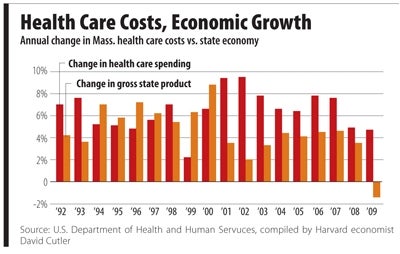After years of debate, Massachusetts lawmakers seem poised to pass some legislation that would control health care costs, and all parties say they’re closer to agreement than they were a few years ago. But local hospital leaders also say they’re worried that state goals on the subject could be too extreme.
Patrick Muldoon, president and CEO of HealthAlliance Hospital in Leominster, said that in past years the state’s hospitals might have argued against the notion of dramatically reducing the rate of cost increases. Now, though, he said, the sort of goal the Legislature is contemplating, with health costs tied to the general growth of the state’s economy, seems pretty reasonable to the industry.
“It gives us all a common measurement to strive for,” he said.
The question looming for the state is what, exactly, the measurement should be. Associated Industries of Massachusetts has proposed a goal of growing health care spending at a rate two percentage points below gross state product. A group of health care providers, in turn, has proposed keeping costs to no more than 1 percentage point above GSP.
Richard Lord, president and CEO of AIM, said the aggressive goal the group is proposing reflects a few factors:
- Economists’ consensus that about 30 percent of current health care spending is unnecessary;
- A marketplace that’s already showing some positive signs; and
- The introduction of new tiered and limited network plans.
“We actually think it’s a doable goal,” Lord said.
Even the less drastic health care goal of the providers group would mark a significant change from past practices. Federal data compiled by Harvard economist David Cutler showed personal health care expenditures rising an average of 6.4 percent a year between 1991 and 2009, while gross state product increased 4.6 percent, on average. Between 2008 and 2009, health expenditures rose 4.7 percent, while the general economy actually shrank 1.4 percent.
Average Premium Hikes Down
This year, as Lord pointed out, at least one statistic suggests health costs are not rising as quickly. The average increase in health care premiums in the small group market-a number that hit 16.3 percent two years ago – is 1.8 percent for coverage starting this month.
A variety of factors may contribute to the much smaller rate increases. Continuing economic hardships, combined with the increasing popularity of high-deductible plans, may have encouraged people to put off non-urgent care recently, leaving insurers with more cash. At the same time, high deductibles and tiered or limited network plans could also be functioning – as many in the industry hoped they would – to encourage patients to get the most affordable appropriate care. For example, someone might go to a community hospital rather than a major teaching institution because it’s on the more affordable tier of their plan, or because they haven’t hit their deductibles yet and expect to pay more at the larger hospital.
“Consumers have now got some skin the game,” said Dennis Irish, spokesman for Saint Vincent Hospital in Worcester.
Targeting Reimbursement Rates
For community hospitals, that kind of trend could be good news. But another factor contributing to lower insurance costs this year is a different story. Hospitals say insurers have pushed hard to negotiate smaller-than-usual increases in the reimbursement rates they pay for various procedures.
“I think most of the insurance companies have come to us and asked us to be stakeholders in this,” said Francis Saba, CEO of Milford Regional Medical Center. “There’s been a feeling that we all have to do our fair share to contribute.”
Saba said he sees the logic in that, but the hospital also needs enough money in its budget to buy new equipment, do the occasional building project, and, especially, give its staff raises.
“We struggle with that issue every time we negotiate contracts,” he said.
Milford Regional’s president, Edward Kelly, added that the hospital has been able to keep employees’ compensation packages relatively flat, in part because there are more nurses in the labor market than there were five or six years ago. He said the hospital has aggressively negotiated contracts with its vendors, standardized products and made other changes to keep operations running leaner. But he said these are largely one-time efforts and won’t keep costs from increasing again next year.
“Obviously, there’s bigger opportunities in the beginning of these processes,” he said.
What To Do About Labor Costs?
At HealthAlliance, Muldoon said that’s especially true of labor costs, which represent about 70 percent of hospitals’ budgets. He said the hospital has been making significant cuts for three or four years to adjust to the increasing focus on health costs, including eliminating some programs and negotiating new union contracts. This year, he said, the hospital didn’t give a raise to non-union employees, although it’s offering a bonus based on financial performance. But he said that’s not a sustainable way to save money.
“You can only give employees a zero-percent increase for so many years,” he said.
Like other hospital leaders, Muldoon warns against setting state goals that are too drastic. Even a seemingly obvious tactic like reducing the use of teaching hospitals could have unintended consequences, he said. Less money for those institutions could make it more difficult to train a new generation of primary care doctors, who are widely regarded as a key to keeping people healthy and out of the hospital.
“Let’s not shoot ourselves in the foot,” he said.
And, of course, hospitals note that the health care industry is a major employer in the state, and one that did relatively well through the recession.
“We are an awfully important part of this economy,” Irish said.
But AIM’s Lord said that, given how expensive insurance is becoming for Massachusetts employers, he’s not convinced that keeping people employed in health care is a good enough reason to eschew a dramatic goal.
“To the extent that we can ease the burden on the rest of the economy, that will be good for Massachusetts as well,” he said.

